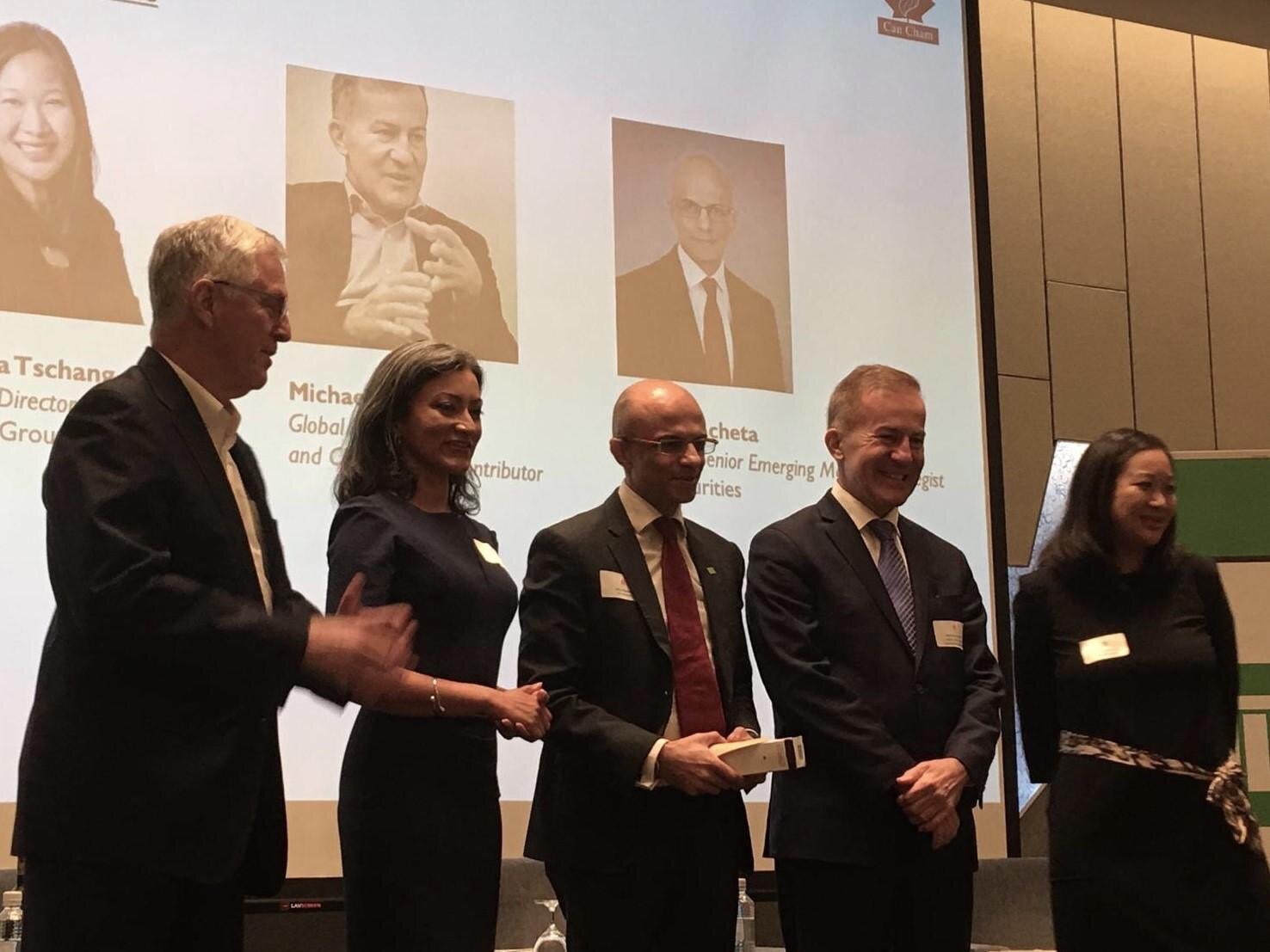Singapore Panel: Is Volatility the Name of the Game for the Remainder of 2019?
L-R: David Wynne (CanCham), Sharanjit Leyl, Mitul Kotecha, Michael Bociurkiw, Chi-Jia Tschang
What are the ‘Top Three’ flash points in 2019? The Hong Kong protests - now into their fourth month with no end in sight. The withdrawal of the United States as the world’s policeman. The US-China trade war. Fears of a global recession and questions over the Fed’s next move. Rising tensions in the Gulf and an upcoming federal election in Canada.
There’s were some of the questions and issue raised during an expert panel in Singapore on October 7, organized by the Canadian Chamber of Commerce in Singapore, and supported by TD Securities and Singapore Airlines. Moderator by BBC World producer/presenter Sharanjit Leyl, the panel featured: Mitul Kotecha of TD Securities, global affairs analyst Michael Bociurkiw, and Chi-Jia Tschang of Bower Group Asia.
The Hong Kong protests were top of mind for all of the panelists, including among their top three flashpoint for 2019. There was discussion about how Singapore is benefitting from the crisis in Hong Kong: Chi-Jia of Bower Group Asia citing a Goldman Sachs report that says up to HK$3-billion in capital flows has been observed from the former British territory into Singapore. And while Hong Kong now represents only 3% of China’s economy, there were doubts as to whether Beijing would sacrificed the economic benefits of the city by taking extreme measures to quell the protests.
Leyl described Singapore as a place which often “punches above its weight” but that it couldn’t completely replace Hong Kong, especially with its extensive links with China. Said Kotecha: “Anecdotally I am hearing more and more evidence that Singapore is benefitting….Singapore has managed to get a great niche in terms of its economic position. It’s a foot hold for a lot of South Asia and Southeast Asia. It has a rule of law that can be argues is one of the best in the region. The political system is one thing - but the economic system works well. It is trade-driven.”
Here are some other bullet points from the panel:
Underlying the Hong Kong protest movement are burning issues which haven’t been properly addressed by the local authorities - especially when it comes to making affordable housing available and addressing other social issues that cause inequality. We have seen these issues create a sense of hopelessness and eventual protests in the Middle East and Ukraine.
There is no end in sight to the Hong Kong protests, Bociurkiw said. And it may have reached the point of no return: “It’s a Hong Kong I hardly recognize anymore. ..I think the British did do their best to lay things down so that Hong Kong’s democracy and things like freedom of expression would last a long time. The anti-corruption measures were one of the hallmarks of their colonial rule. But what is happened is the Hong Kong people feel they’ve been betrayed by the Government. They look over the border to China and say ‘We don’t want to live that way.’
Singapore is already starting to benefit from the chaos in Hong, but it needs to do much more to create the favourable conditions that has allowed the city to become a global business hub. This includes encouraging a workforce which is much less risk averse. “If Singapore can up its game in that regard, the country and the economy can row quite a bit further,” said Bociurkiw.
The global landscape isn’t all doom and gloom. Bociurkiw noted that in the parliamentary elections a few months ago in Ukraine, that an unprecedented number of young people in their twenties ran and won seats in the Verkhovna Rada, which until now has been an exclusive club for oligarchs or those with connections to them. This new wave a youth participation in politics is being seen elsewhere, including in Canada. “In the old days you used to have to have a lot of money to get into politics in places like Ukraine, but not any more…I used to joke that one would know when the Ukrainian parliament was in session because the streets around it would be transformed into a luxury car parking lot. But now you actually see MPs cycling and walking to work. So it really goes to show you the next complexion of politics.
In the run-up to the October 21 federal elections in Canada, the race was neck and neck and that the likely outcome would be a minority government - with one of the third parties holding the balance of power.
The panel was held at the Pan Pacific Hotel in central Singapore. A lively question and answer session followed the panel discussion. CanCham President David Wynne introduced the panelists and provided closing remarks.


